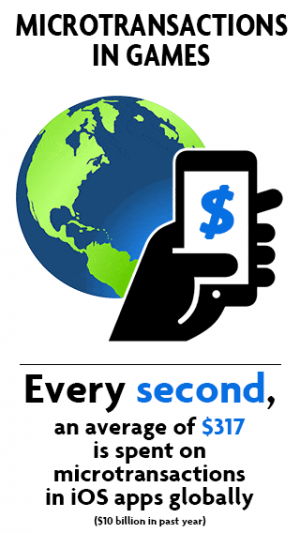Difference between revisions of "Microtransactions"
| Line 4: | Line 4: | ||
== Ethical Issues with Microtransactions== | == Ethical Issues with Microtransactions== | ||
The growing popularity of mobile games through the iOS and Android Playstore have allowed many smaller developers the opportunity to put out content either paid or free-to-play. The Micro-transactions model is more appealing for developers because of the fact that it allows a player base to develop before they start selling products when compared to an upfront cost that oftentimes drives away players unless the game has an established reputation already. This brings up the paradox in many mobile games being marketed as free-to-play when in fact a lot of the higher level content is made available to newer players through micro transactions. This in the eyes of players who have advanced through the game by traditional means devalues their accomplishments. Many of these free-to-play games are made to be played passively, in which the player comes back periodically to check on the game. This leaves players with two options for progressing, investing a substantial amount of time or advance through purchasing virtual products that allow for speed ups or higher tier items that would normally require lots of grinding to obtain the higher level items. | The growing popularity of mobile games through the iOS and Android Playstore have allowed many smaller developers the opportunity to put out content either paid or free-to-play. The Micro-transactions model is more appealing for developers because of the fact that it allows a player base to develop before they start selling products when compared to an upfront cost that oftentimes drives away players unless the game has an established reputation already. This brings up the paradox in many mobile games being marketed as free-to-play when in fact a lot of the higher level content is made available to newer players through micro transactions. This in the eyes of players who have advanced through the game by traditional means devalues their accomplishments. Many of these free-to-play games are made to be played passively, in which the player comes back periodically to check on the game. This leaves players with two options for progressing, investing a substantial amount of time or advance through purchasing virtual products that allow for speed ups or higher tier items that would normally require lots of grinding to obtain the higher level items. | ||
| + | |||
| Line 11: | Line 12: | ||
== Common Terms and Shortcuts == | == Common Terms and Shortcuts == | ||
Add terms as they come up | Add terms as they come up | ||
| − | Free-to-play games - | + | Free-to-play games - Games made available to all players without an upfront cost |
| − | + | Grinding - Repetitive actions that allows for substantial progress in a game | |
Revision as of 21:07, 21 March 2018
Microtransactions also commonly known as MTX is the purchasing of virtual products with real world currencies. Typically these have been implemented as a means of providing developers of free-to-play games with revenue in order to continue development of said games. While they are available on virtually any platform, we have seen a significant increase in their use in the mobile games market. In a study done by Slice Intelligence, we learned that mobile players spent an average of $87 on free-to-play games while PC/Console players spent around $5 on average. Depending on how micro transactions are implemented these games can be called "pay-to-win" in which the purchasing of these virtual currencies are needed to make significant progress in the game, contradicting the whole free-to-play game aspect. Other games provide "loot boxes" in which players purchase these as a means of obtaining more desirable items or features that allow players to save time obtaining these by playing the game. The entire model is based on the idea that providing these virtual currencies will provide more profit than selling the game through a one-time-purchase.Contents
Ethical Issues with Microtransactions
The growing popularity of mobile games through the iOS and Android Playstore have allowed many smaller developers the opportunity to put out content either paid or free-to-play. The Micro-transactions model is more appealing for developers because of the fact that it allows a player base to develop before they start selling products when compared to an upfront cost that oftentimes drives away players unless the game has an established reputation already. This brings up the paradox in many mobile games being marketed as free-to-play when in fact a lot of the higher level content is made available to newer players through micro transactions. This in the eyes of players who have advanced through the game by traditional means devalues their accomplishments. Many of these free-to-play games are made to be played passively, in which the player comes back periodically to check on the game. This leaves players with two options for progressing, investing a substantial amount of time or advance through purchasing virtual products that allow for speed ups or higher tier items that would normally require lots of grinding to obtain the higher level items.
Common Terms and Shortcuts
Add terms as they come up Free-to-play games - Games made available to all players without an upfront cost Grinding - Repetitive actions that allows for substantial progress in a game
See Also
External Links
- [Outside link]
- [Example link]
References
}} (back to index)
